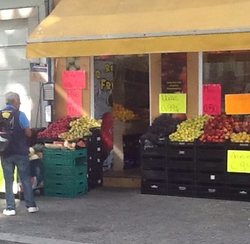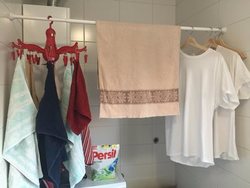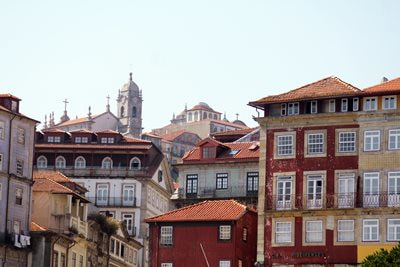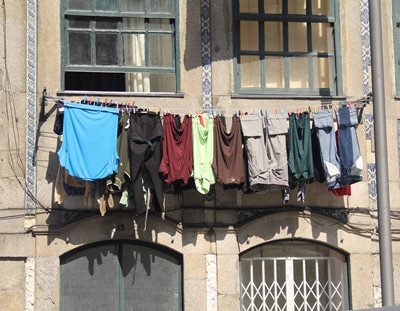|
Living in the heart of a city was a major change for us since Harold and I have always lived in the suburbs, except for a stint in rural Iowa on a farm. The transition to Porto (the urban area boasts a population of 2.4 million) has changed all that. Here’s what we've learned and how we’ve adapted.  Now, within a few minutes' walk, are several fruit and vegetable shops, one of which is called Rei da Fruta (King of Fruit). There is a talho (butcher shop), endless restaurants, three or more shops dedicated to loose tea, laundromats, a health food grocery, you name it. Since we’re surrounded by these mom-and-pop places, we shop these every chance we get. And each encounter allows us to acquire a bit more Portuguese. I remember my first trip to England when I commented on the Barbie-sized refrigerator in the apartment where we were staying. I said it’d barely hold a gallon of milk, upon which my host asked why I would ever buy such a large size in the first place. At that point in time (and still in some places) the milk was delivered to their door in glass bottles. Not so in our old neighborhood: You went to the store once, maybe twice per week, and found ways to store the extra food so it wouldn’t spoil. Here we buy fresh food every couple of days, making the rounds to the butcher and the fruit/veg shop and the grocery store for such things as cat food. Where in the U.S. we would buy food ahead and use our Foodsaver to freeze it, here the freezer is only used for ice cubes. Since the shops are small, the selection varies. Just because I bought some tasty pork roast a few days ago does not mean it's available today. Same with OJ or bananas at the Minipreco or Pingo Doce (grocery stores) if it's at the end of the day. You learn to roll with what foods are in stock and enjoy that fact. This is fundamentally different from living near a major U.S. city where, for the most part, you are always able to find certain "staple" foods 24/7. Though it does occasionally alter our supper plans, we're willing to accept that uncertainty. One reason is that Portugal's produce and meat are incredibly fresh and flavorful, much like when we used to raise our own food on the farm. Mushrooms have a genuine earthy flavor, tomatoes aren't cardboard, and the olives are incredible. The chicken doesn't have that strange chemical smell, and both it, and the meat, cooks differently because of the way it's been raised. Unless you buy organic in the U.S., food there is designed for early harvesting and stability during shipping rather than for taste. That is not the case here. Other changes have occurred because of the significant size difference between our home (2400 sq. ft. with 4 bedrooms, dining room, living room, den, 2-1/2 baths, basement, a year-round sunroom and my own private office in the back yard) and our apartment (about 800 sq. ft. -- 2 bedrooms, living room, 1-1/4 baths). The flat has a small washer (by US standards) and no dryer. This is not uncommon here, so we do small loads of laundry every few days, and hang them out the window on a rack to dry (see the above picture for an example). If it's raining (there hasn’t been much of that as Portugal is in a severe drought), we hang the clothes in the kitchen (see below). Surprisingly this process works well. For larger loads (like sheets and duvet covers) we haul them down to the laundromat and wash/dry them there, though many of our neighbors hang those out as well.  In the U.S we owned several pieces of cookware and small appliances, some of we used sparingly. Here we've been adding pieces as we need them, keeping our possessions to a minimum. Rather than a 12-place setting of Corelle, we have a 6-place setting of dinnerware. We've carefully added small domestic appliances -- though according to Harold the espresso machine was non-negotiable -- and often those have dual or triple uses. To our surprise, our microwave has a grill inside that allows us to toast bread, thereby circumventing the need for a standalone toaster. Since our kitchen isn't roomy, with limited counterspace, this proved ideal. This mindfulness, both regarding our food choices and our possessions, has had benefits. Both of us are much more cognizant of what we're eating, and what items we acquire. If something is added to the household, it has a purpose, or, in the case of a lovely shawl I purchased near Porto's cathedral, a decorative purpose because not everything has to be utilitarian. When our carton of possessions arrives from the U.S, it'll be interesting to see how many of those we will no longer feel we need. This significant lifestyle change, and the mindset that goes with that change, has been eye-opening. Yet another reason we're pleased we made the decision to move here. |
Your HostsHarold is a former software engineer. Jana is an author. Together they're exploring their new life in Portugal. Archives
December 2022
Categories
All
|


 RSS Feed
RSS Feed